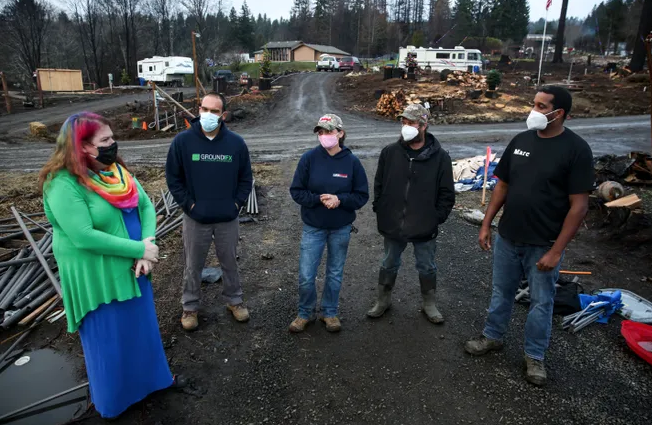
By MATT DENIS/The Eugene Register-Guard
OTIS — Ignore the piles of twisted metal and hulking orange-red skeletons of RVs and manufactured homes and this coastal Lincoln County community could be the site of a new suburban neighborhood.
Three months ago, this town on the incline up Echo Mountain bore a striking resemblance to fire-bombed European cities at the end of World War II. A spark ignited at the top of Echo Mountain Sept. 8 and quickly Otis was ablaze.
Residents fled, grabbing what personal items they could as 50 mph coastal gales rapidly spread flames. In the end, the Echo Mountain Complex fire was a small, 2,500-acre blip in a massive fire season that saw 1.1 million Oregon acres burn. Even so, it destroyed about half of Otis’s 1,241 structures, with 288 homes and 339 structures lost.
A seemingly disparate group has galvanized for the tiny town’s rebirth. Five volunteers, motley in background yet welded by a cause, forged the Cascade Relief Team, an organic response to rebuild.
Reaching out to neighbors
Corey Rivera, a father of eight and leader at Calvary Chapel in Lincoln City, was one of the first residents to return. His manufactured home was one of several hundred trailers and RVs scattered on five winding roads twisting through trees, up and over the mountain’s shoulder. That home in the woods and the trees that sat in front were obliterated.
Upon his return, a dazed Rivera, landscaper by trade, reacted the only way he knew — he began cleaning up. He spent hours digging through debris just to clear a lane to park in his driveway and pop up a tent for shelter.
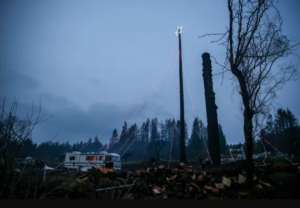
“When I finally got onto my own property, I realized the neighbor needed help and then the next neighbor and the next neighbor after that,” Rivera said.
A few months into the cleanup, neither Rivera nor the worklist seemed to be abating. Fortunately for him, others with nothing left, like Melynda Small, returned to also give it their all.
“I think in the first few days, we had 12 houses on the list, 17 after the first week, then 29, then very quickly, 43,” said Small, who lives in Otis with her husband, Tye, and four children and is the project director, working with different organizations to run the community cleanup.
The Smalls have worked more than 90 consecutive days since October to clear out damaged properties. Like his wife and Rivera, Tye Small is on the ground every day, removing debris from properties on the work list his wife manages.
Melynda Small transferred her knowledge coordinating and planning for four children and her experience in an assisted living facility to take over from Rivera as project director.
“I just like to take charge of things when I see a need. I saw what needed to be done, so I did it,” Melynda Small said. “I don’t like being bossed around, so it’s better I’m the boss.”
Melynda Small and the project team are now working with government agencies, volunteers and displaced residents to clear and, eventually, restore 88 Otis properties.
Whether there are five or 50 hands on deck, Melynda Small has everyone in action.
“When we write Articles of Incorporation for a small town, I’m going to nominate her for mayor,” said Echo Mountain Relief Fund executive director Bethany Grace Howe.
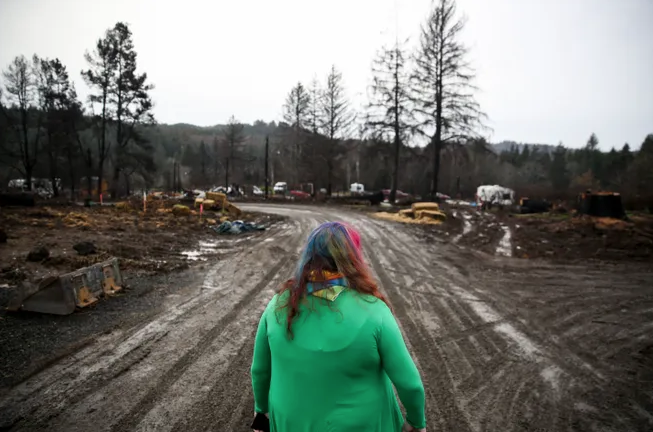
Lincoln City returnee helps coordinate
Howe’s group helps facilitate money and communication for the cleanup and the Cascade Relief Team, organized by volunteer Marc Brooks.
Howe lived in Eugene, but when she heard about the fire in the town she formerly connected with as a Lincoln City journalist, she knew she had to return. Howe first lived in Otis as a man living with a wife. Her transition took her to Eugene and a doctorate in the University of Oregon’s media studies program.
When she returned to Otis in the spring, she attended a Taft High School basketball game. Now a transgender woman in rural, conservative country, Howe felt apprehensive about her reappearance. That’s when local Bill Stempel went right up to her and welcomed her back with a big hug.
“Most transgender people go someplace and they’re scared to death all the time,” Howe said. “I have felt safe in this town from the minute I came back because of men like Bill.”
“And when I saw that Bill lost his house, I just kind of lost it,” Howe said. “I just said, ‘I’m going to Otis and I’m going to help and I’m going to keep helping until Bill gets home.’ And now, to me, everybody up here is metaphorically Bill.”
Howe, whose rainbow hair and flowing sea-green jacket over a blue dress contrasts with Small’s jeans, work boots and Trump hat, organizes the relief fund finances and communicates with various government officials.
This all-encompassing embrace has allowed the team to not only get reconstruction rolling, but to become a hub that helps remove and rebuild. It also provides an array of logistical services, essential supplies and social support from its “command center” — a holiday light-bordered tent flanked by two plastic angels and a school bus nicknamed “Greg.”
This end of a gravel driveway off Pony Trail Lane in the middle of Otis is the informal spot to greet leaders, visitors and community members. “Greg” is an indispensable member of the crew, used to collect and deliver assorted donations to community groups.
“Safeway, the mall, now the mountain, Greg is everywhere,” Howe said.
From the Cascade Relief Project’s Facebook hub, about 20 active contributors participate in the relief team’s “Wren Chat,” so named for the small bird that makes a home in slash piles.
Melynda Small organized a community Christmas party for survivors’ families, established a furniture exchange for fire victims, helped locate services for veterans and seniors, and is creating a database of volunteers and services.
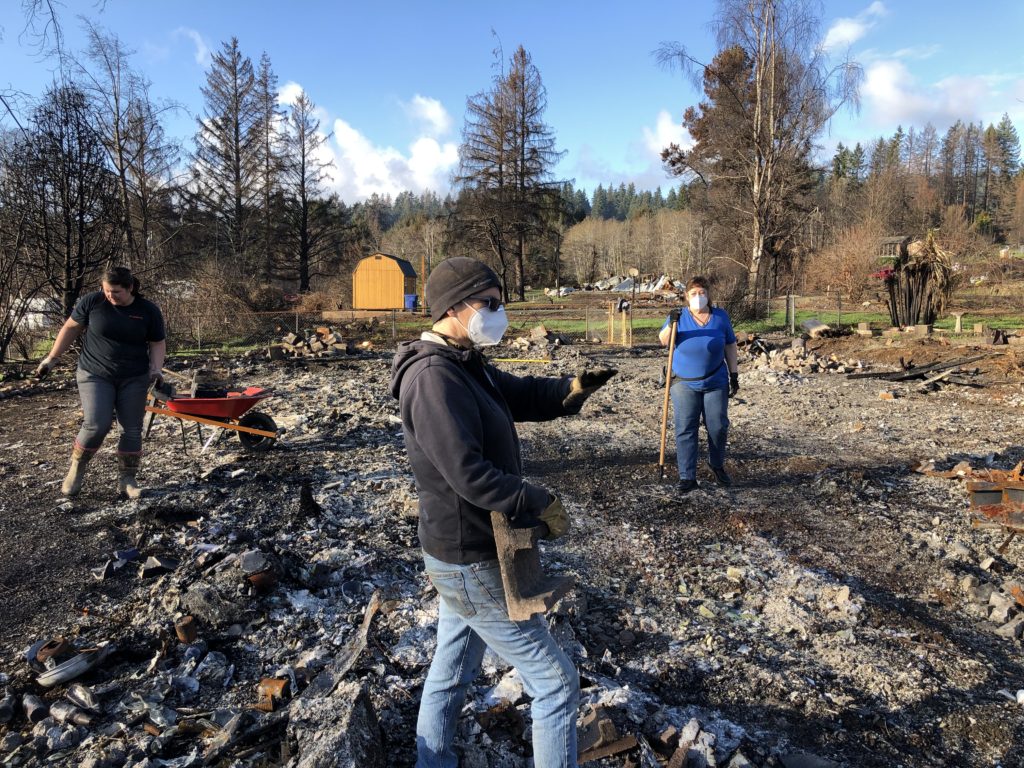
Drawn to help
While many are in Otis today to reclaim land and homes, others have traveled from cities across Oregon and the Northwest, compelled by the Echo Mountain Fire’s devastation.
Each of these humanitarians has a different reason for being in Otis. Brooks came first to check in on Norma Jean Washburn’s work as co-manager of Salmon River Grange survivor outreach services.
“My why, I didn’t know anybody out here except for Norma Jean,” Brooks said. “When I came to visit her, I met a man who was completely lost. He had no clue what to do. I felt like he was completely abandoned.”
With everything in ash, there was nowhere for this man to start until others could show him the way. And Brooks has remained every day for three months, away from his Portland home to help.
His help comes in the form of physical labor and web design. Brooks has been at the heart of financial and organizational efforts in Otis, designing and running the Cascade Relief Team. Even with boots on the ground, positive progress still surprises Brooks among the once-shattered townspeople.
“I saw him yesterday. He gave me a big hug. This saved his life,” Brooks said.
Government cultivation of grassroots renewal
Years of work lie ahead, but for now, the team keeps the free labor organized and makes sure residents understand a progress through the bureaucratic processes of the fire department, Lincoln County Emergency Management, the U.S. Environmental Protection Agency and the Oregon Department of Transportation.
“We’ve worked together through government red tape, foul weather and even Election Day,” Howe said in an email. “All of us know where the other stands. We don’t hide from it; we know it and still manage to leave politics off the mountain.”
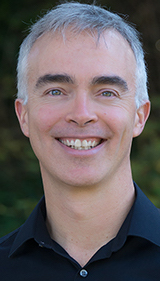
“The timeline of government and bureaucracy are so slow compared to the do-it-yourselfer, but then, they see this spontaneous recovery component,” Lincoln County spokesperson Casey Miller said.
The process for returning residents is to first file a Return of Entry form with the EPA to allow them on the property to clear and catalog hazardous materials. This encourages people to understand that they’re entering a potentially dangerous area.
The EPA already has cleared dangerous debris, like gas cans and propane tanks, and cut out natural hazards like logs, branches and other unsafe detritus. With well over 150 properties cleared, ODOT is scheduled to begin moving out ash and debris. This is normally a 12- to 18-month process for ODOT.
“This is a big relief to me as the county is sort of sandwiched in between,” Miller said. “We want to increase the pace, but we can only move as fast as the state and the feds.”
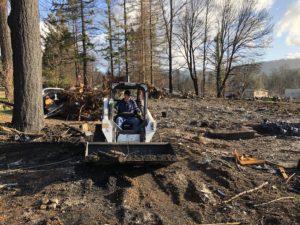
Concerns, though, for these do-it-yourself community rebuilders are proper protection and correct procedure in handling materials that can cause any number of injuries. There are no agencies with the capacity to make sure laborers are following safety guidelines, but it’s their town, so they’re allowed to handle the risk if they want to get it done.
“If a person’s going to tackle this on their own, they’ve got to do it in a way that’s compliant,” Miller said. “When I was up there with the EPA, I didn’t know how important tree safety could be. I wore a hard hat and learned to look at the whole 360 degrees of potential hazards.”
Miller said landowners also will have the opportunity to respond to a questionnaire that property owners can specify what they want to be removed.
“What we’ve discovered is that people are fatigued out there, so we’re making it as easy as we can,” Miller said.
While emergency officials keep a close eye on the grassroots cleanup, there have been no major issues to date.
“The only complaints we’ve received so far are that our bins are too full,” Small said.
Miller expressed his admiration for Otis volunteers.
“It’s been really reassuring to see, especially during these times, that people really do care about other people,” Miller said.
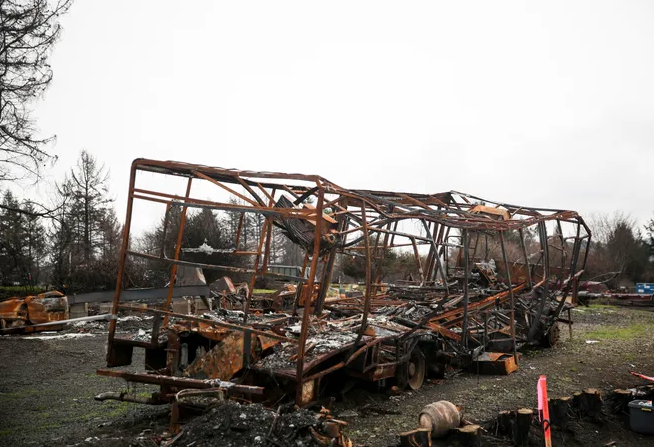
Aspiring for an enduring bond
Behind a blackened garden gnome on Rivera’s property, his burned but stubbornly upright chain link fence now holds court over muddy, yet mostly cleaned ground, ready for a new fabricated home.
“This is what properties will look like when they’re all clear,” Rivera said.
Scheduled to be delivered in April or May, Rivera’s on-order, new home will be one of the first replacements in the sprawling community dotting Echo Mountain’s hillside. Even in December, just months after the catastrophe, about a dozen local residents had RVs parked on lots, sitting amid piles of chopped wood, construction materials and debris.
Over the past few months, people on the ground, along with myriad Lincoln City volunteers, have cleared a portion of the burned foundation and helped to sink new hope into the soil.
“Taking back control of lives is what’s helped people not feel so hopeless and helpless,” Howe said during a tour of the town. “Even if it is only helping neighbors or pitching in a little bit, not even helping themselves, it gives some semblance of control and connection.”
Volunteers will need supplies and construction crews will need capital to get Otis up and running again.
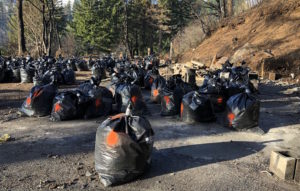
The rebuilding effort has received a Habitat for Humanity grant, $7,000 from the Lincoln County’s Challenge Grant and numerous donations from residents and organizations. This is in addition to government-funded EPA and ODOT cleanup.
“We’ll take $20,000 now, but that money needs to keep coming in,” Small said.
The Echo Mountain Relief Fund will remain on Facebook as long as it’s generating interest.
“It’s there for people in need, but I hope we can keep it going,” Brooks said. “I’m not sure if it will still be around a year from now.”
The reality of rebuilding, however, is that it is going to take a lot of time and endurance.
“And it’s going to take at least 2 1/2 years that we need to sustain that funding,” Rivera said.
The Smalls, despite constantly working, have yet to begin clearing their own property, instead dedicating their efforts to helping dozens of neighbors.
If anything, this diverse collective exhibits what humans can do when devoted to each other and are changing each other’s lives in the process.
For some, like Brooks, it’s just the right thing to do. For Howe, the effort’s in thanks that when she needed the town to be decent to her, it was. For Rivera and the Smalls, this was and remains their home in the woods, away from the city’s bustle and bureaucracy.
“Each one of us are out here for very personal reasons and all driven by the core of who we are,” Howe said. “In a day and age when nobody seems to be able to get along about anything, we agree on everything. When I felt myself coming apart, this has brought me together.”
There is, of course, lots of work left, yet these determined souls are restoring the critical component to rebuilding: Hope.
“What I envision is five years from now everybody’s back and everybody’s here on Labor Day weekend,” Small said, “and this whole thing just becomes a big ole’ block party.”
Matt Denis can be reached at mdenis@registerguard.com.


